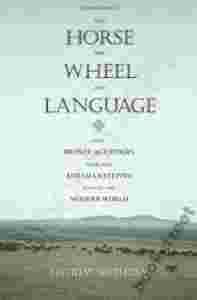|
Roughly half the world's population speaks languages
derived from a shared linguistic source known as
Proto-Indo-European. But who were the early speakers of
this ancient mother tongue, and how did they manage to
spread it around the globe? Until now their identity has
remained a tantalizing mystery to linguists,
archaeologists, and even Nazis seeking the roots of the
Aryan race. ''The Horse, the Wheel, and Language'' lifts
the veil that has long shrouded these original
Indo-European speakers, and reveals how their
domestication of horses and use of the wheel spread
language and transformed civilization. Linking
prehistoric archaeological remains with the development
of language, David Anthony identifies the prehistoric
peoples of central Eurasia's steppe grasslands as the
original speakers of Proto-Indo-European, and shows how
their innovative use of the ox wagon, horseback riding,
and the warrior's chariot turned the Eurasian steppes
into a thriving transcontinental corridor of
communication, commerce, and cultural exchange.He
explains how they spread their traditions and gave rise
to important advances in copper mining, warfare, and
patron-client political institutions, thereby ushering
in an era of vibrant social change. Anthony also
describes his fascinating discovery of how the wear from
bits on ancient horse teeth reveals the origins of
horseback riding. ''The Horse, the Wheel, and Language''
solves a puzzle that has vexed scholars for two
centuries - the source of the Indo-European languages
and English - and recovers a magnificent and influential
civilization from the past. |
|

